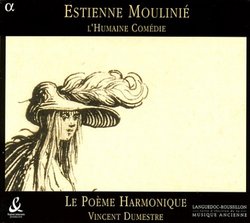| All Artists: Le Poeme Harmonique/Dumestre, Etienne Moulinie, Le Poème Harmonique Title: Estienne Moulinié: L'Humaine Comédie Members Wishing: 0 Total Copies: 0 Label: ALPHA PRODUCTIONS Release Date: 1/1/2000 Genres: Special Interest, Pop, Classical Styles: Vocal Pop, Opera & Classical Vocal, Ballets & Dances, Ballets, Chamber Music, Historical Periods, Baroque (c.1600-1750) Number of Discs: 1 SwapaCD Credits: 1 |
Search - Le Poeme Harmonique/Dumestre, Etienne Moulinie, Le Poème Harmonique :: Estienne Moulinié: L'Humaine Comédie
 | Le Poeme Harmonique/Dumestre, Etienne Moulinie, Le Poème Harmonique Estienne Moulinié: L'Humaine Comédie Genres: Special Interest, Pop, Classical
|
Larger Image |
CD Details |
CD ReviewsRefined Taste Leslie Richford | Selsingen, Lower Saxony | 06/07/2008 (5 out of 5 stars) "Estienne Moulinié (1599 - 1676): L'Humaine Comédie. Performed by Le Poème Harmonique, dir. Vincent Dumestre [Claire Lefilliatre, soprano; Marc Pontus, haute-contre; Serge Goubioud, tenor; Arnaud Marzoratti, baritone; Sophie Watillon, Friederike Heumann and Sylvia Abramowicz, viols; Francoise Enock, violone and bass viol; Nanja Breedijk, double harp; Joel Grare, percussion; Vincent Dumestre, lute, tiorbo and baroque guitar]. Recorded in the Chapel of the Hopital Notre-Dame de Bon Secours in Paris in September and November 1999. Published as Alpha 005 in 2000. Total playing time: 69'49".
Who was Estienne Moulinié? Vincent Dumestre's notes offer an excellent overview of his life and spheres of activity. He was born in Narbonne, where he received his musical education, learning both to sing and to play various musical instruments. After joining his elder brother in Paris around 1621, he began to publish his first compositions, which presumably led to him being appointed director of music to Gaston of Orléans, younger brother of King Louis XIII. As a consequence of Gaston's political intrigues, Moulinié was forced to travel into exile with him. He apparently spent some time in Nancy, serving in Gaston's orchestra together with M. Lambert and Blancrocher. He published airs, lute songs, ballet music, instrumental pieces for viols, later travelling with Gaston's entourage to the Netherlands and Brussels before finally returning to Paris, where, in his old age, he published his "cantiques" and motets. Vincent Dumestre has here selected a wide variety of music from Moulinié's troubled life of wandering, with sung texts in French, Gascon, Spanish and Italian (and, in one case, in a kind of gibberish which was presumably meant to sound like Yiddish). There are lute songs in the Italian, French and Spanish styles and a couple of polyphonic pieces, all delicately and delightfully sung by the quartet of singers. The suite of ballet music is played, of course, on viols accompanied by the lute and, when needed, percussion. The music is never "loud" in the sense of brash but reflects the refined taste of the French royal household at the time, although there are a couple of more raucous pieces such as a drinking-song and the already mentioned nonsense song about a wandering Jew. I found myself enjoying every moment of this recording, which should perhaps be listened to in the quiet of late evening to take its full effect. - Before buying this CD the only music I knew by Moulinié was the Cantique de Moyse as recorded by Les Arts Florissants almost 30 years ago. Although that disc is also worth knowing, I can assure anyone in the same position as I was that Dumenstre's disc is a whole world better, both from the point of view of interpretation and sound, Alpha's technology being impeccable. Also, Alpha provide, as usual, a beautifully printed digipack and booklet with an engraving by Jacques Collot, whom Moulinié probably met in Nancy, and with black-and-white photos from the recording sessions which show something of the delight and dedication the musicians felt while playing these lovely pieces. Recommended to all for whom the seventeenth century is more than just Purcell, Lully or Schütz." |

 Track Listings (21) - Disc #1
Track Listings (21) - Disc #1